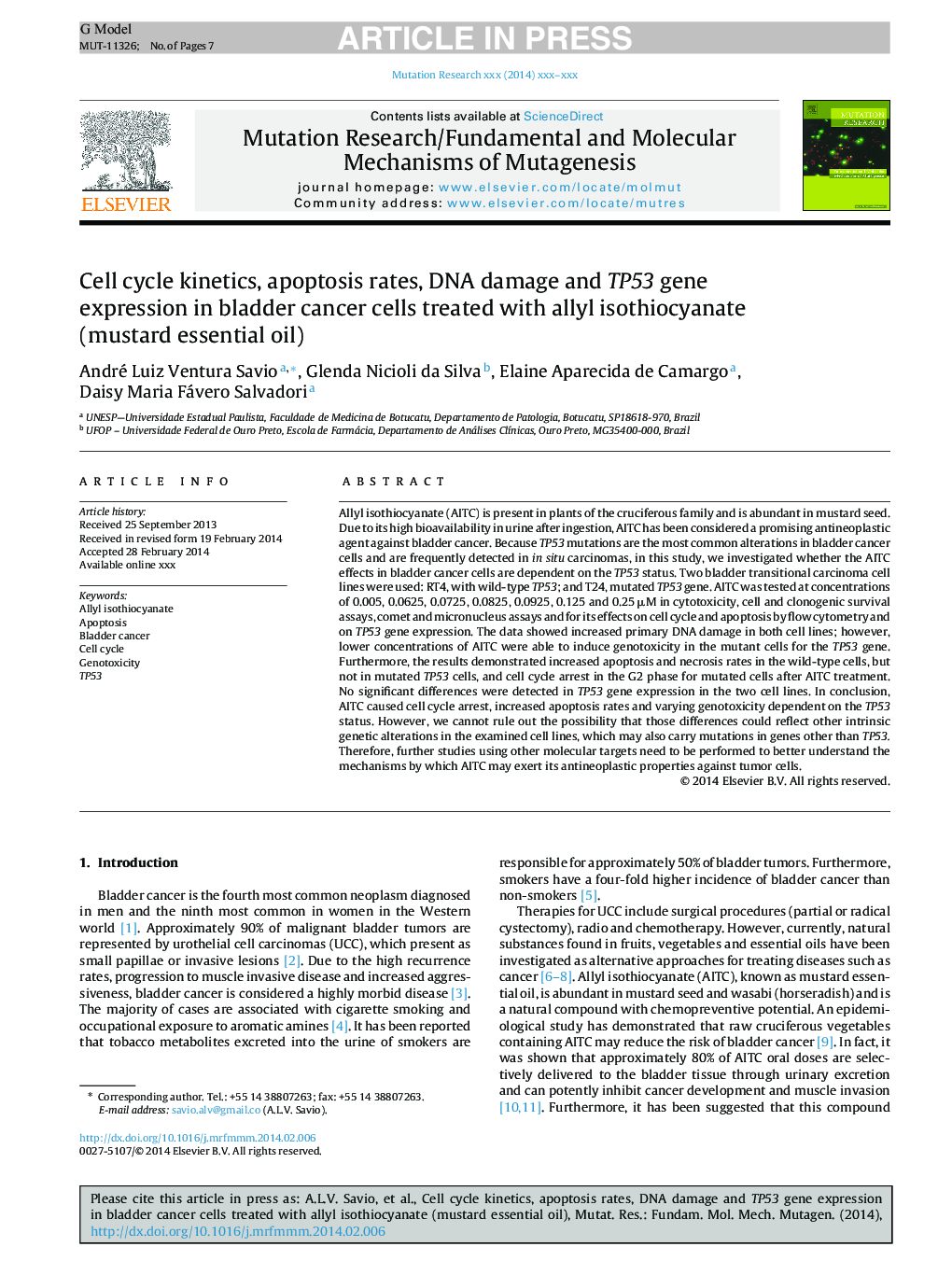| کد مقاله | کد نشریه | سال انتشار | مقاله انگلیسی | نسخه تمام متن |
|---|---|---|---|---|
| 8455835 | 1548335 | 2014 | 7 صفحه PDF | دانلود رایگان |
عنوان انگلیسی مقاله ISI
Cell cycle kinetics, apoptosis rates, DNA damage and TP53 gene expression in bladder cancer cells treated with allyl isothiocyanate (mustard essential oil)
دانلود مقاله + سفارش ترجمه
دانلود مقاله ISI انگلیسی
رایگان برای ایرانیان
کلمات کلیدی
موضوعات مرتبط
علوم زیستی و بیوفناوری
بیوشیمی، ژنتیک و زیست شناسی مولکولی
تحقیقات سرطان
پیش نمایش صفحه اول مقاله

چکیده انگلیسی
Allyl isothiocyanate (AITC) is present in plants of the cruciferous family and is abundant in mustard seed. Due to its high bioavailability in urine after ingestion, AITC has been considered a promising antineoplastic agent against bladder cancer. Because TP53 mutations are the most common alterations in bladder cancer cells and are frequently detected in in situ carcinomas, in this study, we investigated whether the AITC effects in bladder cancer cells are dependent on the TP53 status. Two bladder transitional carcinoma cell lines were used: RT4, with wild-type TP53; and T24, mutated TP53 gene. AITC was tested at concentrations of 0.005, 0.0625, 0.0725, 0.0825, 0.0925, 0.125 and 0.25 μM in cytotoxicity, cell and clonogenic survival assays, comet and micronucleus assays and for its effects on cell cycle and apoptosis by flow cytometry and on TP53 gene expression. The data showed increased primary DNA damage in both cell lines; however, lower concentrations of AITC were able to induce genotoxicity in the mutant cells for the TP53 gene. Furthermore, the results demonstrated increased apoptosis and necrosis rates in the wild-type cells, but not in mutated TP53 cells, and cell cycle arrest in the G2 phase for mutated cells after AITC treatment. No significant differences were detected in TP53 gene expression in the two cell lines. In conclusion, AITC caused cell cycle arrest, increased apoptosis rates and varying genotoxicity dependent on the TP53 status. However, we cannot rule out the possibility that those differences could reflect other intrinsic genetic alterations in the examined cell lines, which may also carry mutations in genes other than TP53. Therefore, further studies using other molecular targets need to be performed to better understand the mechanisms by which AITC may exert its antineoplastic properties against tumor cells.
ناشر
Database: Elsevier - ScienceDirect (ساینس دایرکت)
Journal: Mutation Research/Fundamental and Molecular Mechanisms of Mutagenesis - Volume 762, April 2014, Pages 40-46
Journal: Mutation Research/Fundamental and Molecular Mechanisms of Mutagenesis - Volume 762, April 2014, Pages 40-46
نویسندگان
André Luiz Ventura Savio, Glenda Nicioli da Silva, Elaine Aparecida de Camargo, Daisy Maria Fávero Salvadori,